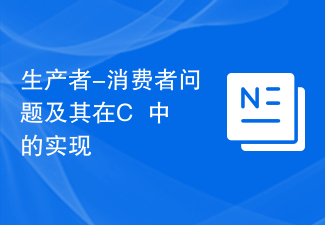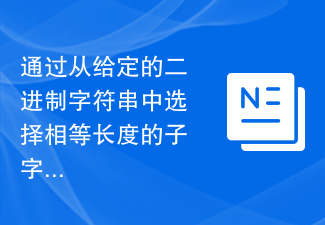
Our current undertaking involves maximizing the number by which we can delete any occurrences containing the minority character(s) within a section comprised entirely by either '0' or '1'. The end goal is simply to reach maximum possible deletions while still respecting all given rules and constraints.
Syntax
To ensure a comprehensive understanding of the upcoming codes let us first familiarize ourselves with the syntax of the method that will be employed before exploring the algorithm and strategies −
int maximizeDeletions(string binaryString, int startIndex, int endIndex)
Algorithm
最大化给定二进制字符串子串中少数字符删除的算法可以通过以下步骤描述:
首先,让我们通过将一个名为 deletions 的变量初始化为零来开始。这个变量的主要目的是监控发生的删除操作的计数。
确定二进制字符串的特定子字符串中数字'0'和'1'出现的频率。可以分别计算这些数字的每次出现。
To pinpoint the minority character(s), we must refer to the counts obtained in the previous step.
从子字符串中删除所有次数较少的字符,并相应地更新删除计数。
将删除的最终值作为结果返回
方法一:遍历方法
The execution of our approach involves traversing through the binary strings substring in a linear fashion and then deleting the minority character(s) all at once.
Example
的中文翻译为:示例
#include <iostream>
#include <algorithm>
using namespace std;
int maximizeDeletionsLinear(string binaryString, int startIndex, int endIndex) {
int countZero = 0;
int countOne = 0;
for (int i = startIndex; i <= endIndex; i++) {
if (binaryString[i] == '0') {
countZero++;
} else {
countOne++;
}
}
int deletions = endIndex - startIndex + 1 - min(countZero, countOne);
return deletions;
}
int main() {
string binaryString;
int startIndex, endIndex;
cout << "Enter the binary string: ";
cin >> binaryString;
cout << "Enter the start index: ";
cin >> startIndex;
cout << "Enter the end index: ";
cin >> endIndex;
int deletions = maximizeDeletionsLinear(binaryString, startIndex, endIndex);
cout << "Maximum deletions: " << deletions << endl;
return 0;
}
输出
Enter the binary string: 1011010011 Enter the start index: 2 Enter the end index: 8 Maximum deletions: 2
Explanation
在方法1中,我们利用线性遍历来最大化从给定二进制字符串子串中删除少数字符的数量。通过遍历指定的子串,我们可以确定在该部分内每个实例的'0'和'1'出现的次数。在确定该区域或组内较少频繁出现的字符(即找到"少数派")之后,我们可以通过从该指定区域内所有字符的计数中减去它们各自的计数来计算可能的删除次数。
这导致了一种有效的方法,可以揭示简单但实用的解决方案 - 只需要对我们的初始字符串进行一次遍历 - 这使得这种方法特别适用于较短的输入字符串。
方法二:滑动窗口
The sliding window technique is another efficient approach to solve this problem. It involves using a window of fixed size to traverse the substring of the binary string
Example
的中文翻译为:示例
#include <iostream>
#include <algorithm>
using namespace std;
int maximizeDeletionsSlidingWindow(string binaryString, int startIndex, int endIndex) {
int left = startIndex;
int right = startIndex;
int countZero = 0;
int countOne = 0;
int deletions = 0;
while (right <= endIndex) {
if (binaryString[right] == '0') {
countZero++;
} else {
countOne++;
}
while (min(countZero, countOne) > 0) {
if (binaryString[left] == '0') {
countZero--;
} else {
countOne--;
}
left++;
}
deletions = max(deletions, right - left + 1);
right++;
}
return deletions;
}
int main() {
string binaryString;
int startIndex, endIndex;
cout << "Enter the binary string: ";
cin >> binaryString;
cout << "Enter the start index: ";
cin >> startIndex;
cout << "Enter the end index: ";
cin >> endIndex;
int deletions = maximizeDeletionsSlidingWindow(binaryString, startIndex, endIndex);
cout << "Maximum deletions: " << deletions << endl;
return 0;
}
输出
Enter the binary string: Enter the start index: Enter the end index: Maximum deletions: 0
Explanation
方法2涉及利用滑动窗口技术来最大化删除少数字符。使用固定大小的窗口,我们遍历子字符串,随着窗口的移动更新'0'和'1'的计数。通过根据计数调整窗口边界,我们识别出少数字符并计算可能的最大删除次数。这种方法通过高效地滑动窗口减少了冗余计算的数量,使其更适用于较大的输入,并提供更快的解决方案。
结论
在本文中,我们探讨了如何从给定的二进制字符串子串中最大化删除少数字符的问题。我们讨论了两种方法 - 线性遍历和滑动窗口技术。这两种方法都提供了高效的解决方案来实现所需的结果。通过理解算法并研究提供的可执行代码示例,您可以将这些概念应用于解决自己项目中的类似问题。请记住要分析问题,选择最合适的方法,并相应地实施。
以上是最大化在给定的二进制字符串子串中可以删除的少数字符数量,使用C++实现的详细内容。更多信息请关注PHP中文网其他相关文章!
 使用C++编写,找到以1开头的二进制字符串的唯一排列数量Sep 05, 2023 am 09:01 AM
使用C++编写,找到以1开头的二进制字符串的唯一排列数量Sep 05, 2023 am 09:01 AM在给定的问题中,我们得到一个由0和1组成的字符串;我们需要找到以1开头的所有排列的总数。由于答案可能是一个巨大的数字,所以我们将其取模1000000007后输出。Input:str="10101001001"Output:210Input:str="101110011"Output:56我们将通过应用一些组合数学和建立一些公式来解决这个问题。解决方案的方法在这个方法中,我们将计算0和1的数量。现在假设n是我们字符串中出现的1的数量,m是我们字符串中出现的0
 中点线生成算法的C++实现Sep 09, 2023 pm 07:49 PM
中点线生成算法的C++实现Sep 09, 2023 pm 07:49 PM一条线连接两点。它是图形中的基本元素。要绘制一条线,您需要两个点,您可以在屏幕上在这两个点之间绘制一条线,就图形而言,我们将这些点称为像素,每个像素都与整数坐标相关联。我们以(x1,y1)和(x2,y2)的形式给出整数坐标,其中x1
 最长非递增子序列在一个二进制字符串中Sep 07, 2023 pm 11:13 PM
最长非递增子序列在一个二进制字符串中Sep 07, 2023 pm 11:13 PM在这个问题中,我们需要找到给定字符串的最长非递增子序列。非递增的意思是字符要么相同,要么按降序排列。由于二进制字符串仅包含“0”和“1”,因此生成的字符串应以“1”开头并以“0”结尾,或者以“0”或“1”开头和结尾。为了解决这个问题,我们将统计字符串每个位置的前缀“1”和后缀“0”,并找到前缀“1”和后缀“0”的最大和。问题陈述-我们给出了二进制字符串str。我们需要从给定的字符串中找到最长的非递增子序列。示例Input–str="010100"Output–4说明最长的非递
 在PHP中,pack()函数的作用是将数据转换为二进制字符串Aug 31, 2023 pm 02:05 PM
在PHP中,pack()函数的作用是将数据转换为二进制字符串Aug 31, 2023 pm 02:05 PMpack()函数将数据打包到二进制字符串中。语法pack(format,args)参数格式-要使用的格式。以下是可能的值-a-NUL填充字符串A-空格填充字符串h-十六进制字符串,低半字节在前H-十六进制字符串,高半字节在前c-带符号字符C-无符号字符s-带符号短字符(始终为16位,机器字节顺序)S-无符号短整型(始终为16位,机器字节顺序)n-无符号短整型(始终为16位,大端字节顺序)v-无符号短整型(始终为16位,小端字节顺序)i-有符号整数(取决于机器的大小和字节顺序)I-无符号整数(取决
 生产者-消费者问题及其在C++中的实现Sep 17, 2023 pm 11:09 PM
生产者-消费者问题及其在C++中的实现Sep 17, 2023 pm 11:09 PM并发计算中普遍存在的同步挑战被称为生产者-消费者问题。鉴于多个线程或进程旨在在访问共享源时协调各自的操作;这个问题需要复杂的沟通任务以及平衡的执行程序。今天的讨论将有助于理解这一困难背后的概念,同时认识到它在当代计算机科学框架中的重要性-特别是在C++实现实践中。理解生产者-消费者问题定义和目的解决生产者-消费者问题带来的挑战的解决方案来自于明确划分负责生产和使用信息的人员之间的责任。当生产者自行生成新记录时,消费者通过同步他们的操作来确保它们被正确使用。人们必须小心避免竞争条件或死锁等问题,如
 检查一个字符串是否可以通过交换二进制字符串中具有不相等字符的索引处的字符对来形成回文字符串Sep 02, 2023 pm 08:09 PM
检查一个字符串是否可以通过交换二进制字符串中具有不相等字符的索引处的字符对来形成回文字符串Sep 02, 2023 pm 08:09 PM问题陈述我们有一个字符串str和一个二进制字符串B。两个字符串的长度都等于N。我们需要检查是否可以通过在字符串B中包含不相等字符的任意索引对上多次交换其字符,使字符串str成为回文字符串。示例示例输入str=‘AAS’B=‘101’输出‘YES’Explanation的中文翻译为:解释我们可以交换str[1]和str[2],因为B[1]和B[2]不相等。最终的字符串可以是'ASA'。输入str=‘AASS’B=‘1111’输出‘No’Explanation的中文翻译为:解释我们无法使字符串回文,
 通过从给定的二进制字符串中选择相等长度的子字符串,最大化给定函数Aug 28, 2023 am 09:49 AM
通过从给定的二进制字符串中选择相等长度的子字符串,最大化给定函数Aug 28, 2023 am 09:49 AM给定两个相同长度的二进制字符串str1和str2,我们必须通过从给定的相同长度的字符串中选择子字符串来最大化给定的函数值。给定的函数是这样的-fun(str1,str2)=(len(子字符串))/(2^xor(sub1,sub2))。这里,len(substring)是第一个子字符串的长度,而xor(sub1,sub2)是给定子字符串的异或,因为它们是二进制字符串,所以这是可能的。示例Input1:stringstr1=10110&stringstr2=11101Output:3说明我们
 计算长度为N的二进制字符串,它们是子字符串的重复拼接Sep 07, 2023 am 10:13 AM
计算长度为N的二进制字符串,它们是子字符串的重复拼接Sep 07, 2023 am 10:13 AM本文的目的是实现一个程序,用于计算由一个子字符串重复连接而成的长度为N的二进制字符串的数量。目标是确定通过重复连接给定文本的单个子字符串,可以创建多少长度为N的二进制字符串,其中N是一个正整数。问题陈述实现一个程序,用于计算重复连接子字符串的长度为N的二进制字符串的数量。示例示例1LetustaketheInput,N=3Output:2Explanation的中文翻译为:解释下面列出了长度为N=3的可行二进制字符串,其中重复连接了一个子字符串。"000":Thesubstr


热AI工具

Undresser.AI Undress
人工智能驱动的应用程序,用于创建逼真的裸体照片

AI Clothes Remover
用于从照片中去除衣服的在线人工智能工具。

Undress AI Tool
免费脱衣服图片

Clothoff.io
AI脱衣机

AI Hentai Generator
免费生成ai无尽的。

热门文章

热工具

SublimeText3 Mac版
神级代码编辑软件(SublimeText3)

DVWA
Damn Vulnerable Web App (DVWA) 是一个PHP/MySQL的Web应用程序,非常容易受到攻击。它的主要目标是成为安全专业人员在合法环境中测试自己的技能和工具的辅助工具,帮助Web开发人员更好地理解保护Web应用程序的过程,并帮助教师/学生在课堂环境中教授/学习Web应用程序安全。DVWA的目标是通过简单直接的界面练习一些最常见的Web漏洞,难度各不相同。请注意,该软件中

PhpStorm Mac 版本
最新(2018.2.1 )专业的PHP集成开发工具

Atom编辑器mac版下载
最流行的的开源编辑器

MinGW - 适用于 Windows 的极简 GNU
这个项目正在迁移到osdn.net/projects/mingw的过程中,你可以继续在那里关注我们。MinGW:GNU编译器集合(GCC)的本地Windows移植版本,可自由分发的导入库和用于构建本地Windows应用程序的头文件;包括对MSVC运行时的扩展,以支持C99功能。MinGW的所有软件都可以在64位Windows平台上运行。






